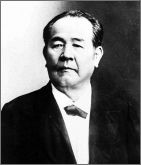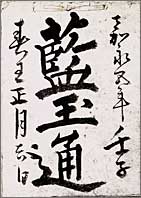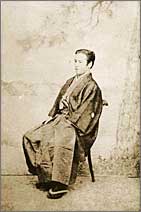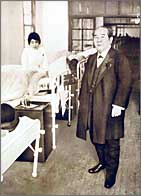 |
|
Shibusawa Eiichi (1840-1931) was a leading figure in the development of Japan's modern society. A dynamic force in the industrial world, he was involved in the founding of some 500 enterprises and economic organizations. Equally dedicated to social and public welfare, he was instrumental in the founding of some 600 organizations for social welfare, education, and international exchange. He was also influential in private-sector diplomacy. Determined to promote individual and private initiatives, Eiichi was a champion of civil society from the late nineteenth through the early decades of the twentieth century. |
| |
|
|
| |
|
|
 |
| "Records of Indigo Dye Purchasing" 1852-1875 |
|
 |
Early Years
Eiichi was born in 1840 to the Nakanchi main branch of the Shibusawa family in Chiaraijima Village in what is now Saitama prefecture. His family was one of the most important in the village, engaging in the production and sale of indigo in addition to farming. While assisting with the family business, Eiichi studied the Chinese classics and then went to study in Edo (now Tokyo) in the early 1860s. For a time he embraced sonno-joi ("revere the emperor, expel the barbarians"), a popular form of anti-foreignism and was part of a group that conceived a plan to capture Takasaki Castle and set fire to Yokohama. |
| |
|
|
 |
| Photograph of the delegation to the Paris Exposition |
|
|
Shogunal Retainer
Eiichi moved to Kyoto and entered the service of Hitotsubashi Yoshinobu, then the governor-general of the Imperial Palace guards. When Yoshinobu became shogun, Eiichi, became a shogunal retainer and was later made a member of the delegation to the Paris Universal Exposition. During this year-and-a-half sojourn in Europe, he observed firsthand the social system and institutions of various countries. He put this experience to use upon his return by following Yoshinobu to the Shizuoka domain and participating in the founding and management of the joint-stock corporation Shizuoka Shoho Kaisho. |
| |
|
|
 |
| Eiichi during his years at the Finance Ministry |
|
|
Member of the Meiji Government
Eiichi served in the national government from 1869 until his resignation in 1873. He initially accepted an appointment as Chief of Tax Bureau at the Ministry of Civil Affairs (Minbusho) at the strong urging of the powerful politician Okuma Shigenobu and later became the Chief of the Reform Office (Kaisei Kakari), an organization founded on his own proposal. Eiichi also held offices in the Ministry of Finance, including that of head of the currency office. |
| |
|
|
 |
First National Bank
(Dai-ichi Kokuritsu Ginko) |
|
|
Contributions to the Building of Japan's Economy
After leaving government, Eiichi became the superintendent of the First National Bank. From then on he founded and fostered approximately 500 corporations, most of them in banking, establishing the foundations of a modern Japanese economy. As a leader in business circles he worked to coordinate opinions and to activate the Japanese economy. |
| |
|
|
 |
| Visiting the Edison Electric Company in Chicago |
|
|
Private-sector Diplomacy
The need for "private-sector diplomacy," initiatives to solve international issues through active exchange not only between nations but also between individuals in the private sector, became widely recognized after the conclusion of Russo-Japanese War (1904-1905). Japan, following its victory in that war, had become a stronger player in the international arena and was consequently facing diplomatic issues of increasing complexity. Eiichi soon became a central figure in private-sector level diplomacy. He was able to accomplish a great deal in this field, especially in the task of improving Japan-U.S. relations. |
| |
|
|
 |
| Visiting the Yoiku-in, a welfare center in Tokyo, the Yoiku-in was dedicated to helping the sick and in need. |
|
|
Encouragement of Social Welfare and Education
Eiichi was untiring in his contributions not only to private sector diplomacy but to social and public welfare as well. It is said that he affiliated himself with nearly 600 projects throughout his lifetime. He supported these diverse projects in a myriad of ways including administration and financial support of welfare and medical institutions; promotion of commercial, women's, and private education; encouragement of cooperation between labor and management; and contributions to urban planning for the city of Tokyo. |
| |
|
|
|
|
The End of 91 Years of Life
On November 11, 1931, Eiichi's life of ninety-one years came to a close. The path from his house in Asukayama to his funeral at Aoyama Mortuary was lined with mourners bidding their final farewell to a man who had made such great strides on behalf of the modernization of Japan. Many organizations and well-known people held memorial services in his honor. Eiichi's final resting place is Yanaka Cemetery in Tokyo, near the grave of his former lord Yoshinobu. |